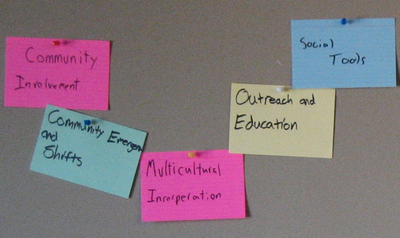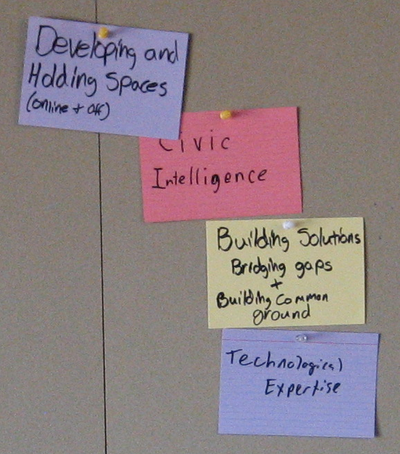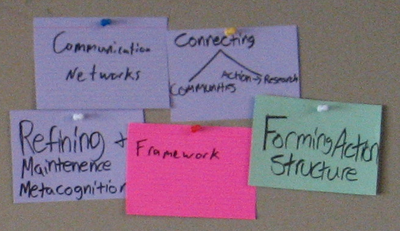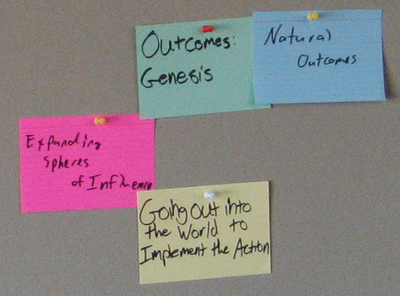CIRAL Group Project
Contents
- 1 Project Description (purpose, etc.)
- 2 Stakeholders (needs, roles, and responsibilities)
- 3 Implementation Models
- 4 Course Components
- 5 Project Explorations
- 5.1 Local Economy
- 5.2 Social Action: Presence and Voice
- 5.3 Producing a good or a service:
- 5.4 Put on an event that builds community or enrich peoples' lives:
- 5.5 Crowdsourcing information for civic ends:
- 5.6 Organizational Accountability:
- 5.7 Public Mental Health Care:
- 5.8 Non-zero sum game workshop:
- 5.9 Public Space Clean Up
- 5.10 Free School Project
- 5.11 Add at least one project and your name to this page by next Wednesday
- 6 Plan
- 7 Other
- 8 Status
- 9 Issues, Complaints, and Suggestions
Project Description (purpose, etc.)
The goal of the CIRAL is to create a student lead and run class/organization that encourages and teaches social action for the betterment of not just our society, but those around the world. The focus will be primarily working with local organizations. The hope is that this class will last between 2-10 years, although longer would be preferred.
Among the goals of this project are;
- To create a culture of lifelong education
- Building the skills necessary to be effective citizens
- Integrate community with university, starting locally but expanding in later years
- Integrate social theories with social practice
- Explore and encourage social innovations
Stakeholders (needs, roles, and responsibilities)
As we flesh out the Implementation Model we'll be able to get a better idea of who we need involved in what capacity. This may become more than just a description of who will be involved in what capacity. Part of our consideration should be how do we get these people involved and excited about CIRAL.
- Students in Patterns of Intelligence program
- Potential CIRAL students
- Potential CIRAL community members
- Center for Community-based Learning and Action
- Evergreen Faculty members
- Evergreen administration
- Others??
Implementation Models
How to build this section
What do we need to find out to flesh these models out?
Ideas:
- Time/work requirements for x credits
- What sort of curriculum outline is required to get approval
- student to faculty limits
- enrollment guidelines
- can the class go with only a handful of students
- is it okay if students sign on to a group contract without having involvement in writing it
- What can we do to get faculty approval for contracts before students sign on to it
- Do we need to talk with an academic dean?
*probably lots more
All models will include a core class which;
- Teaches basics of understanding ideas in a group context
- Enables people on different contracts/projects to communicate, share ideas, compare and enhance their own projects
- Has a manual designed to help students ask the right questions, especially in terms of coordinating group planning.
- Does something along the lines of Steven Johnson's idea of a coffee house, where students will "identify environments that stimulate networks of ideas/insight," and where this "liquid network of ideas and experiences lead to innovation" and hopefully the "slow hunch." -(From Steven Johnson's "Where Good Ideas Come From" Ted-talks).
What do we do summer quarter??
4 Credit Core Model
- Votes (4)
4 Credit Main Class
- Bi-weekly meetings to collaborate and learn the skills for starting or enhancing civic intelligence programs
Student Contracts
- 4-8 credit individual and/or group contracts added onto the class.
- These contracts will either work with local organizations already in place, or help create new ones
- Contracts will be predetermined for first quarter, with intent of letting students decide in later semesters.
- Contracts should cover a variety of interests
16 Credit Full Year Model
- Core Curriculum as defined above.
- Community work defined during the first quarter and carried on throughout the year.
16 Credit Quarterly Model
- Core Curriculum.
- Community work either predefined or loosely defined at the beginning of each quarter.
SOS Model
Need to find out more about student originated studies...
Who can we talk to?
Non-Program/Course Models?
Models of CIRAL(or aspects of CIRAL) as a supplement to current programs and groups within Evergreen that deal with Civic Intelligence. Any model of CIRAL as something other than a program or course.
Course Components
Topic Brainstorm
This is a brainstorm of topics that should (or could) be covered in the core class
Please add to this list
- Budgeting
- Ethnography
- Facilitation skills
- Grant Writing
- Models of Non-profit Organizations
- Motivational Speaking
- Planning and Management
- Social Change -- Theory and Practice
- Writing Evergreen Learning Contracts
- Visual Presentation Abilities
Research
Here's our summary from Saturday's workshop. Can other folks in the research group add to this? It doesn't seem to be a very complete recollection of our insights.
The first step for our research component is to build a framework for exploration. As we begin data gathering we will need to develop tools for parsing that information. Specific research projects will develop out of interest of participants and better understanding of the group's capability. The scope of research will broaden from local inquiry to international as the project develops.
The following photos probably don't belong here!
Action
Can someone post a summary from Saturday?
Think Tank / Ongoing Research and Other Work in "Home Office"
"Home Office" / "Think Tank"
In addition to preparing people to go into the field (which includes cultural competency, skill-building, etc.), the following research and related activities could be undertaken as part of the research work in what we might call the "home office" or "think-tank" . Athough these activities are specifically listed in relation to Evergreen's Gateways project, that supports education for incarcerated youth at Green Hill, they are generally applicable to other projects as well.
- Policy research and development work
- PSA & other public awareness work
- Research on economic impacts of incarceration (now about 60 - 70 billion dollars direct expenses yearly in US)
- Institutional memory of the project
- Curricular development or other training and educational programs for Gateway and Evergreen community members
- Educational philosophy of the project and Evergreen's support
- Institutionalization of the project, in general and at Evergreen
- Exporting model (to other schools and other regions)
- Researching other relevant approaches (in other regions, countries, departments, etc.)
- Placement in jobs, education
- Surveys and other approaches to understanding the problem and evaluation
- Technical support to project, e.g. logistics, computer, administration, planning, facilitating design
- Mapping and community studies (e.g. of places students come from)
- Understanding problem domain, history, economic and political contexts,
- Maintain relevant reference (etc.) library or other resource
- Identifying resources and securing them
- Facilitating conversations, conferences, working sessions, etc. about the problem and possible solutions
Project Explorations
This section should evolve into at least five projects that students could engage in through the lab. In the four credit core model, these projects could be proposed as individual/group learning contracts that students could sign on to during the first week of class.
Local Economy
Social Action: Presence and Voice
Producing a good or a service:
Growing food, cleaning water.
Put on an event that builds community or enrich peoples' lives:
Secret Cafe, Non-zero sum game nights, workshops.
Crowdsourcing information for civic ends:
Scientific research through smart phones, imagery analysis during natural disasters.
Organizational Accountability:
Researching an organization through publically available information, as well as investigating private details.
Public Mental Health Care:
Creating a (radical) local mental health solution that connects people with neural diversity/mad gifts with resources that they need. Depathologize mental illness, as well as mental health symptoms that we all face as everyday life issues, by providing alternative literature/audio for self-care.
Non-zero sum game workshop:
Simulation of how life is a non-zero sum game, and making the connection through activities that use a proxy as the platform of discussion.
Public Space Clean Up
Free School Project
Add at least one project and your name to this page by next Wednesday
Plan
- Roles
- Researcher(s) - dig up critical information that is unknown to the group
- Brainstorming - add as much as you can to lists and descriptions
- Questioners - do descriptions make sense? are lists nearing completion or missing something? question as much as possible!
- Editors - reformat, clean up, sort, and clarify what is written
- Task descriptions
- Class models - these need to be fleshed out from sketches to working models for the lab. What sort of information do we need to accomplish this?
- Projects - brainstorm and add ideas to existing projects, create new projects, speculate on feasibility
- Add needs, roles, and responsibilities to stakeholders list
- Develop a timeline through the end of the quarter
- Add your own tasks
- Timeline
Other
Status
Project in infancy




